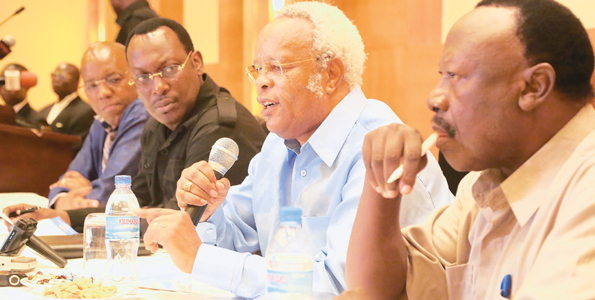Boys continue to perform better in UCE

Herbert Nasasira (L) and Marvin Mugula (R), who scored Aggregate 11 and 10 respectively in the Uganda Certificate of Education exams from Namirembe Hillside High School, celebrate with their head teacher, Mr Erias Mugisha, yesterday. PHOTO BY MICHAEL KAKUMIRIZI
What you need to know:
Statistics. According to UNEB, 9.2 per cent of male candidates passed in Division One compared to 6.1 per cent girls.
The Numbers
6% - Percentage of male students who failed the exams compared to 7.2 per cent of female students.
52.2% - Percentage of female candidates who passed in Division Four compared to 44.2 per cent of male students.
306,165 - Number of candidates who sat for the examinations last year compared to 289,012 students in 2013.
1.3% - Percentage of female candidates who registered for the exams but did not sit for them.
KAMPALA. Boys have continued to
Uganda Certificate of Education (UCE) results, maintaining more than 10 years’ record of excellent performance.
Similarly, girls were better in English and other Arts subjects while their male counterparts led in Sciences.
“This is the trend that has been observed over the years,” Mr Mathew Bukenya, the Uganda National Examinations Board executive secretary, said during the release of the results in Kampala yesterday.
Mr Bukenya said 9.2 per cent male candidates passed in Division One compared to 6.1 per cent girls while 17.1 per cent female candidates passed in Division Two compared to 13.4 per cent males.
A total of 306,165 candidates sat for the examinations.
It was noted that performance in Sciences continues to be poor among many candidates despite government’s efforts to promote them.
The poor performance in Science subjects was blamed on lack of practical teaching despite the tremendous effort by the Ministry of Education to supply laboratory equipment in schools.
“Candidates found problems in handling apparatus during the practical tests as well as making and recording observations and drawing conclusions from those observations, tabulation of experimental results and interpretation of the results, among others,” Mr Bukenya said.
The performance in Mathematics also dropped significantly at the distinction and credit levels while Physics dropped significantly at all grades.
“In Mathematics, poor performance has been consistently shown in the areas of construction of graphs, solving the simultaneous equations, skills of geometrical construction, vectors, the set theory, fraction expressions and computations of compound interests, among others,” Mr Bukenya said adding: “Chemistry has improved for the second year running.”
The Uneb boss, however, said the percentage pass levels remained low. Biology showed a slight drop at the distinction grade but overall performance improved.
Agriculture, Art and Commerce all showed some improvement in performance. Good grades were, however, recorded in English and humanities where overall pass level has improved except geography where a significant drop was recorded.
The Minister for Education, Ms Jessica Alupo, however, observed that the gap in enrolment between females and males is closing and the completion rates for the female candidates have continued to improve.
“It is also pleasing to note that the gender parity at the UCE level is almost being achieved. With the gap between male and female candidates down to only 2 per cent. Only 1.3 per cent of the female candidates who registered did not sit the examination this year,” Ms Alupo said.
“This means that more of the girls remained in school and took the examination,” she added.
A total of 146,366 female candidates sat for the examinations. out of the overall 306,165 candidates.
Ms Alupo said the rate of absenteeism had dropped and is the lowest in the last five years.
“This means that the learners are entering school and remaining to end the cycle,” the minister said.





